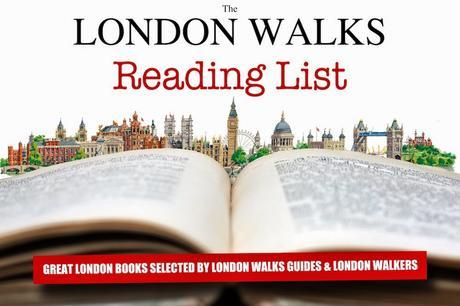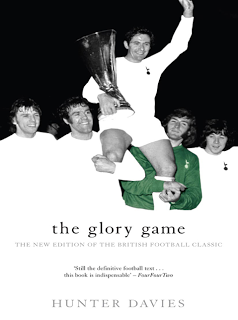
Throughout March & April 2015 we'll be compiling our definitive London Reading List.
We've asked London Walks Guides & London Walkers to recommend a favorite book or story, and we've also raided the archives here at The Daily Constitutional to bring a rich and varied selection of London-themed and London-set reading matter.
Whether you live here in London, work here, play here or if you are in the throws of planning a trip to visit us here, these are the books you need to read. As usual, you can give us a shout with your own recommendations – thrillers, literary classics, biographies, anthologies, anything! – at the usual email address, via Twitter or Facebook, or simply leave a comment below.
 No.30 The Glory Game (1972)
No.30 The Glory Game (1972)
By Hunter Davies (Mainstream Publishing) It seems like an age ago now, but there was once a time when football (by which me mean soccer) was a topic of conversation reserved only for those in-the-know. A codified world, largely working class, almost totally masculine.
Then came Nick Hornby’s book Fever Pitch.
Hornby’s eloquent memoir of the trials and tribulations of life as an Arsenal supporter crossed over into the literary mainstream, garnered great reviews outside the sports pages. And deservedly so. It is a great book, by a great writer.
But then the deluge.
In the wake of Fever Pitch, football too entered the middle class mainstream. Before long, every celeb, every telly actor, every politician was shoehorning references to “footie” into their public utterances.
If you’d like to know what the world was like before such working class heroes as Tony Blair (ahem) and David Cameron (ahem-ahem) were spouting off about their love for Newcastle United and Aston Villa (!) then The Glory Game is the place to begin.
In the two decades before Fever Pitch, Hunter Davies’s warts-and-all portrait of life behind the scenes at North London’s Tottenham Hotspur Football Club was the only book on football. The only one. Sure there were “memoirs” of retired pros, formulaic, ghostwritten affairs intended as Christmas stocking fillers. But nothing insightful, nothing that the clubs didn’t want us to know.
Davies’s book changed all that.
Published in 1972, Davies had enjoyed unprecedented access to the club to research The Glory Game. This access included the dressing room, the training ground and even the players’ homes. Davies witnessed rivalries and conflicts first hand. Everything ended up in the book.
“His accuracy,” wrote former Arsenal and Scotland goalkeeper Bob Wilson, “is sufficiently uncanny to be embarrassing.”
If Davies’s book was such a revolution, one might ask, then why didn’t it start its own avalanche of copycats? The answer is simple. His portrait of life behind the scenes at a major football club was deemed by everyone inside the game to be so explosive that no writer was ever allowed such unfettered access to a club again. In today’s climate, with every club running a well-oiled publicity machine, it is unlikely that such access will ever be granted.
The Glory Game, therefore, stands alone as a fly-on-the-wall account of the internal politics of football. And it remains a classic 40 years on.
And here's our London Walks Podcast on football…
A London Walk costs £10 – £8 concession. To join a London Walk, simply meet your guide at the designated tube station at the appointed time. Details of all London Walks can be found at www.walks.com.











